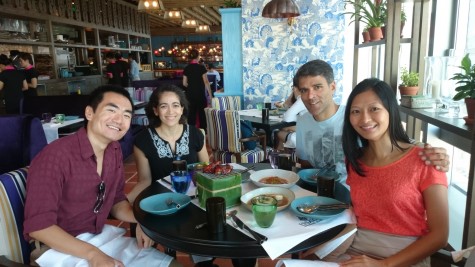 I kind of failed and didn’t take any pictures today. I’ll just post a few extra pictures from the next day to make up for it. Conversation from the next day actually pertained to today, so it kind of makes sense.
I kind of failed and didn’t take any pictures today. I’ll just post a few extra pictures from the next day to make up for it. Conversation from the next day actually pertained to today, so it kind of makes sense.
For our last day in Shenzhen, my dad drove us the other direction (away from the city) to get a sense for the booming real estate market in the area. We stopped at a posh-looking gated development area right next to the ocean. It was a skeleton of a “city.” The stores and shops were all under construction, though banners indicated what would soon fill the empty spaces. The domiciles were a little more developed. Most were finished, though empty. A real estate agent told us that he could only show us the most expensive units because the rest were sold.
Sold? To be clear, we’re not talking about a row of houses that end in a cul-de-sac, or a low rise, or even a high rise. We’re talking about something like ten high rises and ACRES of single unit houses. The development has its own bus system. Staff are even shuttled from the main office in little golf cart like vehicles. And all of that [empty space] was sold?
The next day, Cindy and I reunited with my cousin, whom I had not seen for 17 years or so. She described Shenzhen as a lawless land of opportunity. That perfectly described what Cindy and I had seen for the past five days.
There’s no city planning. Streets go everywhere and nowhere. If the destination at the end of the street was successful, the street became busier. If not, it ends abruptly at an abandoned building. My cousin said that, when she was last in Shenzhen, she asked for directions but oftentimes the person wasn’t familiar with the location. They explained to my cousin that they had just moved to Shenzhen and were only familiar with their immediate surroundings.
For those who “make it,” developments like the one my dad showed us are their reward. They seclude residents from the craze of Shenzhen proper and bathe them in an artificially created luxurious environment. Some might see it as a way to stash their newly made money. Other are simply enamored with buying property, something they were not able to do until roughly twenty years ago. It’s certainly not a China with which I am familiar–lacking order but overflowing with possibility.
Tomorrow we head to Hong Kong before leaving the next day for Beijing.

 Español
Español
I just read an article today about the counterfeit Apple stores in Schenzhen. It boggles my mind that they can get away with that over there. Fake Apple stores selling real Apple products at a premium. Lawless land of opportunity for sure!!
My favorite was the Brada store
A picture of the Brada store would be cool. Also, I saw in 60 minutes once that many of the apartments in those buildings are bought as investment but then people never live in them and they end up there new and never inhabited. Entire newly constructed cities are ghost towns apparently. I don’t know to what extent that is true.
I felt like that was true. The place we went to was like a shell of a city waiting to be filled in. Its definitely a different way to think about the pressures of housing. I found it fascinating yet eerie.
Cindy esta muy bonita tu historia pero ponla en español para conoser a través de tu aventura las diferentes ciudades k andas conosiendo saludos
Erika! Gracias por leer el blog! Creo que quizas eres la unica que lo esta leyendo en espanol. Ya publique esta entrada en espanol.
This seems to be a favorite topic of NPR and their China correspondent, empty towns, all built up with nobody to live in them. Is china going to have a big bubble burst or what?? And then after the housing bubble bursts will it will be manufacturing bubble to go next? Companies moving to Africa?
I don’t listen to NPR, but I’ve read about the ghost towns. I think a better term is maybe speculation. From what I can tell, and from interpreting what my dad has told me, developers are building in the direction that they expect development to head. And then investors are gobbling up property in anticipation of rising property values, or as future retirement residences, or as just somewhere to stash their money (Chinese stock market holds a much lower percentage of household wealth than in other countries).
It’s entirely possible that those developments never have very many people living in them. It’s also entirely possible that that might be OK.